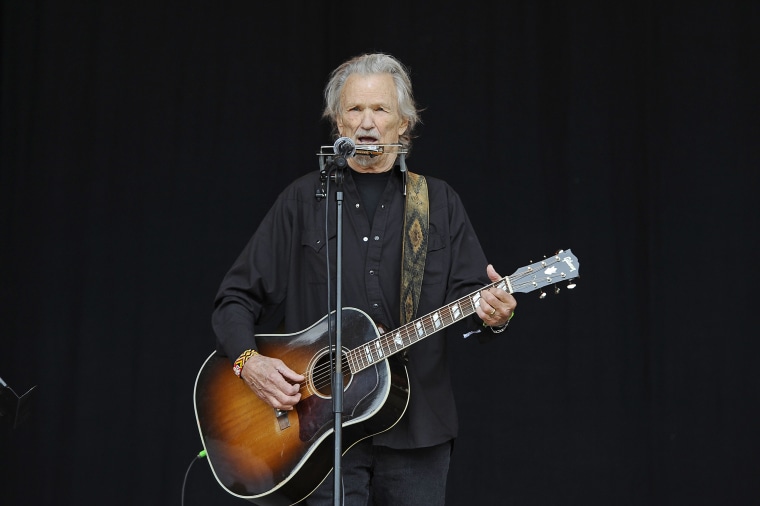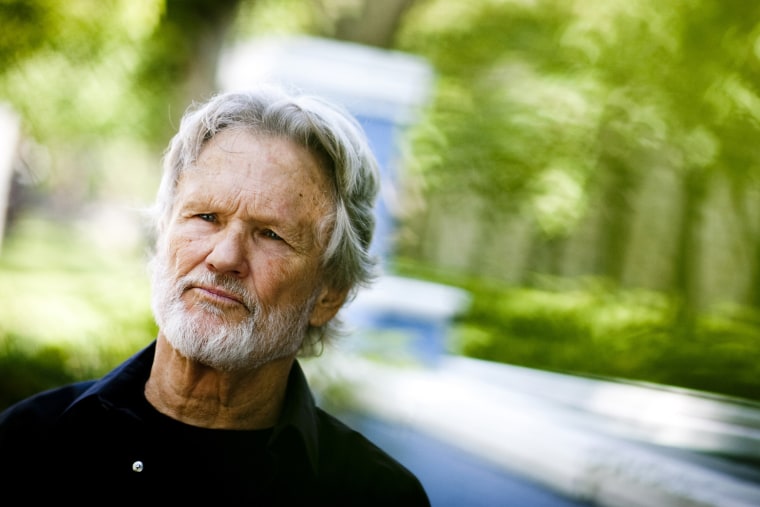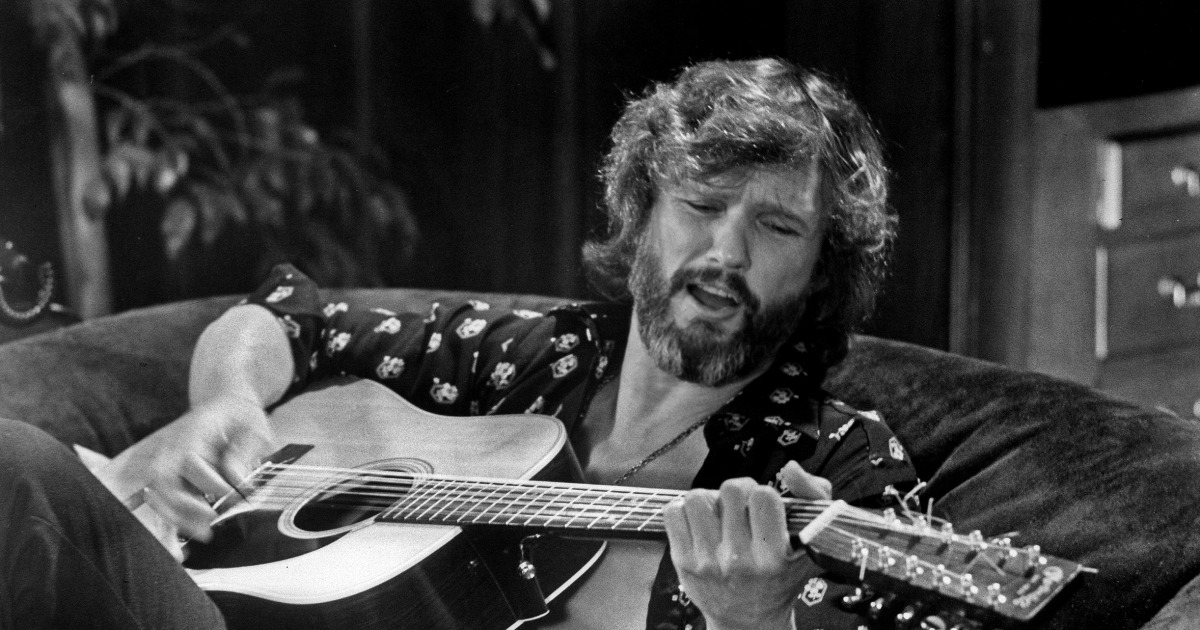Kris Kristofferson, the actor, musician and long-haired activist who embodied the countercultural spirit of postwar America, died at his home in Maui, Hawaii, on Saturday, a representative confirmed.
He was 88.
“It is with a heavy heart that we share the news our husband/father/grandfather, Kris Kristofferson, passed away peacefully on Saturday, September 28 at home,” said a family statement shared by spokesperson Ebie McFarland. “We’re all so blessed for our time with him. Thank you for loving him all these many years, and when you see a rainbow, know he’s smiling down at us all.”
The cause of death was not available.

Born in Brownsville, Texas, Kristofferson played high school football in San Mateo, California, and ended up at Pomona College in eastern Los Angeles County before he headed to Oxford as a Rhodes Scholar, according to his biography.
He returned, joined the Army, where he is said to have flown helicopters, and was tapped by a superior to teach English at West Point, but instead he turned to songwriting.
His music came at a time when the nation’s baby boom was coming of age. Inspired by the genre-bending of Hank Williams and Bob Dylan, who made country and folk cool, he moved to Nashville, Tennessee, and worked as a janitor at a music studio so he could catch a sound wave from musicians who recorded there, including Dylan and Johnny Cash.
The proximity seemed to help, and by the 1970s, Kristofferson was a known talent in Nashville. His song “Sunday Mornin’ Comin’ Down” was performed by Cash and was named song of the year in 1970 by the Country Music Association, according to his biography.
Though Kristofferson believed he sang like a “frog,” he was persuaded to add “singer” to his songwriter title, and he released his debut album, “Kristofferson,” with such notable songs as “Sunday Mornin’ Comin’ Down,” “Me and Bobby McGee,” “To Beat the Devil” and “Help Me Make It Through the Night,” his biography says.
As his influences broke down barriers, Kristofferson, did, too, with the self-titled release, which was felt far outside Tennessee. The queen of hippy soul, Janis Joplin, made “Me and Bobby McGee” one of her signature songs.
In Kristofferson’s official bio, Dylan is quoted as saying, “You can look at Nashville pre-Kris and post-Kris, because he changed everything.”
In 1971 he won his first Grammy Award, for his songwriting, on best country song winner “Help Me Make It Through the Night,” performed by Sammi Smith. His “From the Bottle to the Bottom,” performed with Rita Coolidge, won the Grammy Award for best country vocal by a duo or group in 1973, and they won the award again in 1975 with “Lover Please.”
It was also the era when Hollywood called, and Kristofferson became an archetype — his hair, his wisdom, his romance seen throughout the country via the hit remake “A Star Is Born,” in which he portrayed an aging music icon opposite an up-and-comer portrayed by Barbra Streisand.
He won the Golden Globe for best performance by an actor in 1977 for the movie, which was released the previous year.

He returned to music, joining the supergroup the Highwaymen alongside Cash and Waylon Jennings, in the 1980s.
After the successes in the 1970s, Kristofferson drank in excess and suffered depression, according to his biography.
Kristofferson’s activism was present in his music, and in the 2000s and 2010s his sounds and lyrical ideas seemed to reconnect with music fans.
He paired up with noted producer Don Was, who helped Kristofferson release a string of critically acclaimed albums and earn a Grammy nomination for best Americana album.
“I was in Nicaragua with the Sandinistas,” he said in an Esquire magazine interview published in 2006. “I’ve argued for Leonard Peltier, Mumia Abu-Jamal, the United Farm Workers. I’ve been a radical for a long time. I guess it’s too bad. I’d be more marketable as a right-wing redneck. But I got into this to tell the truth as I saw it.”
In 2016, the Woody Guthrie Center in Tulsa, Oklahoma, established to honor the legacy of its eponymous folk icon, awarded the Woodie Guthrie Prize to Kristofferson. The annual honor seeks to recognize “outstanding contributions to music and activism,” according to the center’s website.
Two years later, another remake of “A Star Is Born” was released, earning more than $436 million worldwide, according to IMDb. It featured Bradley Cooper as the character Kristofferson portrayed; Lady Gaga took Barbra Streisand’s role.
That year, Kristofferson’s verified Facebook page said Cooper joined him onstage for some Hollywood magic as production on the film was underway.
“Two years ago at the Glastonbury Festival Bradley Cooper borrowed Kris’s audience to film a concert scene for the new A Star Is Born,” it said. “The torch has been passed and Gaga and Bradley are the new Barbra and Kris.”
In 2014, the Grammy Awards recognized Kristofferson for lifetime achievement. Country hitmaker Rodney Crowell, tapped to give a tribute, described the moment he heard about this refreshingly disruptive artist.
“News reached my small corner of the world that there was this helicopter-piloting, William Blake-quoting Rhodes scholar by the name of Kris Kristofferson, whose songs were transforming the country and popular music airwaves,” Crowell said, according to the Grammy Awards.
“By creating a narrative style that introduced intelligence, humor, emotional eloquence, spiritual longing, male vulnerability and a devilish sensuality — indeed, a form of eroticism — to country music, Kris Kristofferson … did as much to expand the mainstream accessibility of an all-too-often misunderstood art form as Roy Acuff, Hank Williams, Johnny Cash, Roger Miller, Willie Nelson, Ray Charles … ,” he said.
Crowell added, “And, lest we forget, the man is one hell of an accomplished actor.”
Kristofferson is survived by his wife, Lisa; children Tracy, Kris Jr., Casey, Jesse, Jody, John, Kelly and Blake; and seven grandchildren.

